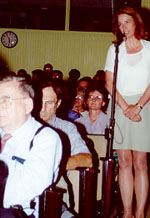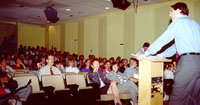Faculty Town Hall Meeting, June 15
The following are excerpts from Dr. Ray Greenberg's Town Hall Meeting, held on June 15. For the complete version, visit the president's webpage at <http://www2.edserv.musc.edu/president/speeches/town_hall1.htm>
 Left
photo: A faculty member shares her thoughts during the 90-minute gathering.
The meeting, held in the Basic Science Building Auditorium, was packed
with faculty members who expressed their concerns and opinions to Dr. Greenberg.
Right photo: Dr. Ray Greenberg addresses the faculty during the Town Hall
Meeting held on June 15.
Left
photo: A faculty member shares her thoughts during the 90-minute gathering.
The meeting, held in the Basic Science Building Auditorium, was packed
with faculty members who expressed their concerns and opinions to Dr. Greenberg.
Right photo: Dr. Ray Greenberg addresses the faculty during the Town Hall
Meeting held on June 15.
The Mission
“...the three components of our mission, education, research,
and clinical service, are intimately related. As an institution, we cannot
talk seriously about being nationally or internationally prominent in one
area without excellence in both of the other two.
“... it appears that some faculty are concerned that their new president is not committed to all three aspects of our mission. It is certainly true that my personal career has been focused on research and education. It has been almost two decades since I was involved directly in delivering patient care. I am not here, however, to reshape the Medical University in the image of my own pursuits. My goal is to build as strong an academic health science center here as possible, and that requires a robust, vigorous, innovative clinical program.”
Faculty
“We should avoid watering down faculty performance by placing
unrealistic expectations across multiple areas of performance. If we want
to be strong across the board as an institution, then we need to celebrate
success in any one of our core areas.
“In my opinion, the greatest deficiency in our present educational environment is our facilities. We cannot attract the best teachers and the best students to the Medical University, if our learning environment looks like a disaster area. We have not built significant educational facilities on this campus in over two decades.”
Research Growth
“Research on this campus has grown at an astounding pace. Extramural
funding has risen fivefold over the past decade. We have surpassed both
Clemson and USC in the magnitude of our research enterprise. In my opinion,
continued growth of research on this campus will require three key ingredients:
(1) additional facilities; (2) improved infrastructure; and (3) strategic
investments in equipment and personnel.”
Financial Challange
“...the clinical arena... is the part of our mission that clearly
is facing the greatest challenge. Much of the problem is financial and
I have been asked to comment on the sources of this problem. There really
are multiple causes. First, the Balanced Budget Act of 1997 has hit
the Medical University, and academic health centers in general, especially
hard. In our medical center, we lost cumulatively over $17 million in disproportionate
share and another $20 million in direct and indirect medical education
payments. At Charleston Memorial Hospital, we lost $10 million in disproportionate
share payments because of the Balanced Budget Act and a reallocation within
the state because of decreased patient activity there.
“The federal reductions were compounded by deeply discounted private insurance reimbursement. We are now collecting only slightly more than half of billings. I doubt that any of this is news to you. What you may not realize is that the worst year for us in terms of financial performance was 1999. During that year, our hospital lost about $40 million. There were sufficient reserves accumulated in prior years, so that the deficit simply ate into those reserves. This year, we will come close to balancing the budget in the hospital, which represents a tremendous improvement over last year. The problem is that we have used up our accumulated surpluses and there is little margin for error.”
Solutions
“There is every reason to believe that this challenge will be
met. First, tomorrow the Board of Trustees is scheduled to review and approve
the final steps toward implementation of the hospital authority. It has
been estimated that we can save as much as $10 million in operations through
efficiencies in procurement and a more market-based paid time-off package
for employees. In addition, we have been fairly successful in encouraging
our state elected representatives to appropriate matching funds for the
disproportionate share program and improving hospital Medicaid reimbursement
levels. The state budget is not yet finalized, but some compromise between
the House and Senate versions could bring anywhere from $5 to 9 million
in extra revenue. Finally, there are several bills before Congress right
now intended to bring partial relief for some of the cuts created by the
Balanced Budget Act. In combination, the authority, state appropriations
and restored federal funding could help alleviate some of the pressure
on us.”
MUSC's Future
“Given the modest size of our population base, we simply are
not going to compete with the major national centers across the board.
We need to be focused.
“...the future will require us to be geographically disbursed.
“...I believe that downtown Charleston will become an increasingly inconvenient and expensive location for patient care.
“... I think that we have to approach new facilities in an incremental fashion.
“...I believe that capital needs and other factors will require that we affiliate with other providers in various markets.”
Faculty Departures
“...the total number of faculty in the College of Medicine has
risen by over 15 percent during the past two years. If anything, we are
certainly not experiencing a net loss of faculty.
“To me, one of the most damaging aspects of these departures is
the growing perception that the administration does not care about them.
Indeed, I have heard repeated on several occasions that when confronted
with the issue of departing faculty, one of our senior administrators reportedly
said that it is no big deal, we will just replace them. This comment, whether
actually spoken or just urban myth, has grown to mammoth proportions. If
nothing else is remembered from my remarks today, I hope that this message
will be preserved. We have an investment in every faculty member on this
campus. We recruited you here because we wanted you to develop your career
on this campus. We hope to provide an environment where you can succeed
and feel valued and rewarded. If we have failed to do that, then we have
failed you in a fundamental way. I am firmly committed to working with
you to restore a sense of trust and confidence that must exist between
the administration and the faculty.”